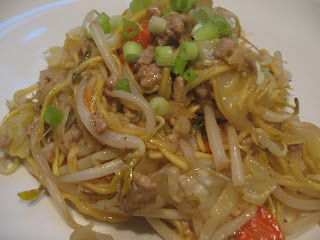 |
| Copyright 2011 LtDan'sKitchen blogs |
Tres Leches Cake is one of those cakes that taste really good but is somewhat challenging. The process of soaking the cake in a dairy trifecta of cream, evaporated milk and condensed milk suggests a soggy mass in cake form but in reality, this cake is very light and perfectly moist. Another issue is how to contain all this liquid from oozing out without serving a cake that looked like it peed on itself (sorry, bleach that thought). The recipe is courtesy of Emeril Lagasse and although I don't usually watch his shows, I needed a recipe for this cake and he has two versions. I've made both of them but I think I prefer this second version. One consideration is that the cake is almost usually baked in a 9x13 baking pan but I prefer a round cake so I used a 10-inch springform pan. One worry I had was how the change in cake pans will affect the cake and indeed, I had to do some sculpting. The cake came out a bit uneven with the sides rising more than the center portion so I had to surgically even out the cake using a serrated knife before soaking it with the milk. The extra mounds were actually really good with a cup of hot coffee so no complaints there.
The first time I made this cake, it was too stressful for me thinking of ways to prevent this cake from "leaking" although it really was meant to do that. I prefer to bake a cake that presents itself well generating oohs and aahs while satisfying my guests at the same time. Although this cake did do just that, I had to tweak the recipe to contain the plumbing issues. To achieve this goal, I used only half of the soaking liquid and used only portions of it to soak the cake. The recipe below is the second version that Emeril have on his show, is of Latin American origin and uses a lot less of the soaking liquid compared to the first recipe that I tried. The cake is also completed with a frosting of boiled icing instead of whipped cream. Of the two I made, I prefer this cake a bit more.
*Tres Leches Cake -Adapted
 |
| Copyright 2011 LtDan'sKitchen blogs |
2 cups all-purpose flour
6 large eggs, separated
2 cups granulated sugar
2 tsp baking powder
1/2 cup whole milk
1 tsp vanilla extract
Soaking liquid:
12 oz can evaporated milk
14 oz can sweetened condensed milk
1 cup heavy cream
Frosting:
6 tbsp water
1 1/2 cup white sugar
6 egg whites
1. Preheat the oven to 350°F.
2. Lightly grease and flour a 10-inch springform pan. Set aside. In a
small mixing bowl, sift together the 2 cups flour and baking powder.
3. In the bowl of an electric mixer fitted with a whisk attachment,
beat the egg whites on medium speed until soft peaks form. Gradually
add 1/2 cup of granulated sugar with the mixer running, beating until
stiff peaks form. Transfer to another bowl.
4. Mix the egg yolks with the remaining white sugar and beat on high until
triple in volume. Fold in the beaten egg whites. Add the flour mixture
to the batter in stages, alternating with the whole milk, beginning and
ending with the flour. Add the vanilla extract.
5. Pour the batter into the prepared pan and place in the oven and bake
for 35 minutes, until a toothpick inserted into the center comes
out clean. Remove the cake from the oven and place on a wire rack
to cool for 10 minutes.
6. In a blender, combine the evaporated milk, sweetened condensed
milk, and 1 cup of the heavy cream. Cover and blend on high for 45
seconds. Save half of the milk mixture, cover, and refrigerate until
ready to serve the cake.
7. Pour 1/2 of the remaining milk mixture over the warm cake. When
the cake has soaked up most of the liquid, pour the remaining half
of the milk mixture over the cake, and cool to room temperature.
Cover and refrigerate until well chilled, at least 4 hours or
overnight. Make sure the top part of the cake is even.
8. To make the frosting, boil the sugar with the water over medium low
heat without stirring until it reaches 230°F on a candy thermometer.
When you are close to reaching this stage, whip the egg whites until
soft peak forms. Over medium speed, drizzle in the sugar syrup and
once added, raise the speed to high until stiff peaks are formed.
Frost the cake and pipe rosettes if desired.



















